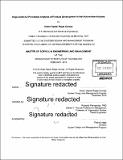Organizational processes analysis of product development in the automotive industry
Author(s)
Rojas Gomez, Victor Daniel
DownloadFull printable version (7.650Mb)
Other Contributors
Massachusetts Institute of Technology. Engineering Systems Division.
Advisor
Roberto Fernandez.
Terms of use
Metadata
Show full item recordAbstract
This thesis provides an analysis of specific process phases associated with the vehicle components development process at Ford Motor Company. I will be using the Organizational Process as the foundation to explore opportunities to improve the existing process. As with any other organization, Ford Motor Company has areas of opportunity in the organizational arena. Being on the verge of the next automotive revolution, the organization needs to analyze whether or not it is in the right position to develop the cars for the future. With more than 100 years of history the company faces some legacy challenges that permeate in the culture of today's organization. Being formed around figures of cult and the scars left by turning the company around to avoid bankruptcy could inhibit Ford from keeping pace in a demanding and changing industry. In Ford's current organization, the product development engineers play a key role in engineering and developing the vehicles that people will drive in the years to come. The challenges of simultaneously developing trucks, high performance cars, autonomous, electric and hybrids vehicles, while keeping up with innovation requires engineers to be on top of their competencies. It also requires an organizational environment that supports them. A comprehensive analysis of the process of developing automotive components is presented using the three lenses framework. This methodology reveals performance challenges in three categories or lenses: strategic design, cultural and political. The organizational process analysis presents a desired state and the paths to achieve that change. It is proven that inefficiencies in the engineering process create higher cost in reworks, which could impair the ability to compete with technology companies looking to disrupt the industry.
Description
Thesis: S.M. in Engineering and Management, Massachusetts Institute of Technology, School of Engineering, System Design and Management Program, Engineering and Management Program, 2016. Cataloged from PDF version of thesis. Includes bibliographical references (pages 74-75).
Date issued
2016Department
Massachusetts Institute of Technology. Engineering and Management Program; System Design and Management Program.Publisher
Massachusetts Institute of Technology
Keywords
Engineering and Management Program., System Design and Management Program., Engineering Systems Division.